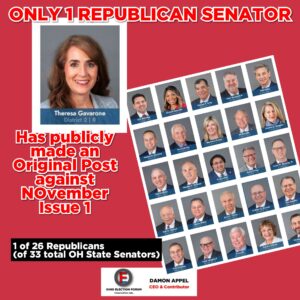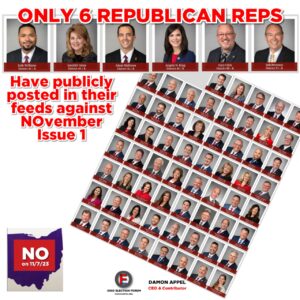Regarding Ohio vaccine pending legislation, much attention has been given to HB248 which was introduced in April 2021 and has been stuck in committee only eight days after being introduced. The bill has been effectively stalled since then. However, there are at least four other bills that merit attention, and any of these, though less comprehensive and with specific potential pitfalls, are steps in preserving health freedom. Which bills are they?
Links are provided for each bill to encourage you to read them for further understanding.
HB 248
https://ohiohouse.gov/legislation/134/hb248
First, I want to give a brief focus on HB 248. The bill has a central philosophical premise regarding individual freedom for health care choices. This bill is for public and private freedom of choice for vaccination. As with any of these bills, terms need to be understood such as “employer” which in this bill defines employee as defined by 4113.51 of the Ohio revised code which states: ‘”Employee” means any person who performs a service for wages or other remuneration for an employer..’ https://codes.ohio.gov/ohio-revised-code/section-4113.51
This bill states that no one should be required by an employer or other defined entities to take a vaccine, except as noted in the following Ohio revised code sections,
https://codes.ohio.gov/ohio-revised-code/section-3313.671, and https://codes.ohio.gov/ohio-revised-code/section-5104.014. You should know that these exceptions cover long-standing treatments like for polio and chicken pox, so typical objections to this bill as from Governor DeWine are deceptive. It doesn’t eliminate all vaccination protocols.
Since HB 248 bill has been stuck in house committee since April 2021, as of this article, for almost one year, other options should be explored despite the bill having value. Groups supporting the bill have not been able to make progress to get the bill out of committee since April 2021.
HB 218
https://www.legislature.ohio.gov/legislation/legislation-summary?id=GA134-HB-218
- Prohibits schools and employers from requiring a vaccine, drug, a biological product, a form of genetic immunotherapy or genetic vaccine technology that does not have a biologics license or full approval. This does not allow emergency use authorization to be used to require any of these.
- If any of the above receives a biologics license or full approval, and is required by any of the above entities, this bill provides for exemptions and for legal recourse for injuries attributed to the above. See the bill for more specific recourse terms, but in brief summary:
- Unless a person is an employee or student in an ICU or children’s hospital, they can submit a written religious or conscientious objection to the vaccine, and the employer must accept it.
- (Those in an ICU or children’s hospital would still probably have recourse as today, under Title VII of the Civil Rights Act of 1964.)
- Prohibits businesses from refusing entry or services based on vaccination status.
- (There is a provision that allows a judge in a courtroom to have such a policy, but this is no different than today’s current situation.)
- A written statement signed by a physician who has a relationship with an employee or student may be provided with no additional information required beyond that, with an exception of testing requirements. This bill requires an institution to accept the written statement.
- Regarding COVID-19, though explicitly not stated for COVID-19 here, testing for natural antibodies against vaccine antibodies may be challenging as vaccinal antibodies may be a number of times higher than natural antibodies. I am not saying that the higher number of vaccinal antibodies is necessarily better, but I am saying this might provide a challenge for obtaining an exemption.
- Prohibits the Department of Health from setting retesting frequency more than once a year. This frequency limit is different than HB 435 (referenced below) in that HB 435 does not specify a limit.
- Employee or Student is not responsible for costs for testing of active infection and masking.
- Employee or Student is responsible for natural immunity testing.
- Prohibits a school from denying school activities to a student based only on the their “COVID-19” vaccination status. COVID-19 is explicitly mentioned here.
- Adds worker compensation for COVID-19 injuries.
Note the original text of the bill is for extending bar hours and exempting them from a statewide COVID-19 curfew. A criticism of the bill is that the text was changed to include the aforementioned items with very little time for representatives to read and understand the updated bill.
HB 411
https://www.legislature.ohio.gov/legislation/legislation-summary?id=GA134-HB-411
This bill would be enacted immediately due to emergency status. Prohibits employers, public and private from requiring COVID-19 vaccination statuses from employees and customers. Subject to federal law for record disclosure to other entities. Permits the type of legal recourse by an individual if an employer breaches confidentiality.
HB 435
https://ohiohouse.gov/legislation/134/hb435
States the following:
- “A school, private college, or state institution of higher education shall not require a student to receive a COVID-19 vaccine for which the United States food and drug administration has not issued a biologics license.”
- There’s similar language for employers regarding their employees.
- Important to note that this bill distinguishes a biologics license from emergency use authorization.
There’s a number of similarities between HB 218 and this bill, but HB 435 does not limit the department of health’s retesting frequency for employers, whereas HB 218 limits the department of health’s retesting frequency guidelines to no more than once a year.
HB 481
https://ohiohouse.gov/legislation/134/hb481
To enact sections 3792.05 and 4113.73 of the Revised Code to enact the COVID-19 Vaccination and Passport Protection Act to prohibit schools, institutions of higher education, employers, and places of public accommodation from requiring COVID-19 vaccines or proof of vaccination.
This bill only applies protections against “COVID-19” vaccines and doesn’t have the “gene therapy” terminology of some of the other bills.
….
Each bill has its own focus regarding vaccination status confidentiality and individual vaccination choice.
At this point, I want to compare those who are running for governor of Ohio specifically regarding these bills. Where do they stand?
Mike DeWine
He is definitively against HB 248. ““I certainly oppose House Bill 248,” DeWine said during a news conference Thursday morning.” (https://www.nbc4i.com/news/local-news/dewine-rebukes-vaccine-choice-bill-being-considered-in-ohio/) He cites a polio vaccine saving lives. His philosophy is that hospitals, i.e. health administrators, should dictate policy regardless if a parent does their own research and objects to their child taking a vaccine.
It is critical to note that the polio vaccine is one of the exemptions in HB 248’s deferral to the Ohio Revised Code (see above summary for HB 248 where vaccination would still be required). Polio vaccination would still be required where outlined in the Ohio Revised Code aforementioned sections. This makes DeWine’s analogy inaccurate.
https://www.statenews.org/government-politics/2021-07-14/dewine-signs-bill-banning-schools-colleges-from-mandating-covid-19-vaccine-under-emergency-use. For a health freedom bill not summarized in this article, DeWine signed a different bill, HB 244, which bans vaccine mandates from learning institutions that do not have full approval, but note his explanation. His explanation was that he wants more people to take COVID-19 shots and by pressuring the FDA to take these shots from EUA to full approval, this will reduce hesitancy in more people.
As with at least one bill above, HB 244 does not restrict the following, as noted in the article:
“The amendment on vaccines does not apply to hospitals or health care facilities that are owned by, operated by, or affiliated with a university or college.”
Democrats urged DeWine to veto this bill.
From HB 244, I got that DeWine might support a bill that bans non-FDA full approval vaccine mandates from various entities, but will not support a bill that bans mandates that are for vaccines that have received full approval. DeWine has indicated many times that the underlying push is to further promote acceptance of COVID-19 vaccines.
One thing to note with HB 248 and these bills in focus is that they provide for legal recourse, such as if a person suffers side effects, and in the case of HB 411, recourse if vaccination status confidentiality is violated. I did not see DeWine address these. If he has, I would love to see a reference for any instance of him addressing these. Also, HB 248 and others provide exemption routes, including immunity. I did not see DeWine address this either if he would be in support of such exemption routes. He has repeated in several instances, in statements and press conferences, that those “who are not vaccinated should talk to their physician” https://shp.ohio.gov/Portals/0/FOR%20IMMEDIATE%20RELEASE-11042021.pdf. In that way, he exhibited at least at surface level medical freedom, knowing that he has employed other methods in promoting mass vaccination, such as through lotteries, scholarships, partnerships with various entities, and blanket statements of calling unvaccinated people as “at risk”, which by that criteria includes children. (“Lower vaccination rates put children under 12, who don’t yet have a COVID-19 vaccine authorized for their age group, at risk”, https://governor.ohio.gov/media/news-and-media/dewine-issues-urgent-appeal-to-covid19-vaccine-providers-06072021.)
DeWine said he would veto HB 218:
https://www.mariettatimes.com/opinion/editorials/2021/12/dewine-is-right-to-veto-hb-218/.
The only support I saw from DeWine regarding these bills is anything that would promote more acceptance of COVID-19 vaccines.
Joe Blystone
He has been vocal many times in support of HB 248 and with medical freedom in general in context of vaccine mandates, and has attended rallies in support of medical freedom pertaining to vaccine mandates. OhioAMF Interview with Joe Blystone, Candidate for Ohio Governor
The following statement from his campaign site affirms personal choice over coercion, which is what HB 248 also affirms.
“COVID-19 has brought many issues to the forefront, including body autonomy—and who really has the power to determine what a citizen must put on or in his or her body. The government has no business telling Ohioans what is best for you or your family’s health. As governor, I will work with all health care providers and consumers, in addition to the leading medical experts within our state, to examine how the administrative “public health” agencies and authorities can be modernized away from a “one size fits all” approach. I will focus on solutions that better support an individual’s right to make their own informed medical decisions without government interference.”
He is not in favor of HB 218 for reasons listed here on his campaign site: https://www.blystoneforgovernor.com/hb218.
I encourage you to read his Blystone Plan, and specifically, the Restoring Freedom section:
https://www.blystoneforgovernor.com/wp-content/uploads/2022/01/The-Blystone-Plan-for-Ohio.pdf. This plan includes issuing an executive order to outlaw vaccine mandates for public and private employees. Interesting to note that the executive order encapsulates many items that the above bills would provide if passed. Blystone has stated on his website that “our State Constitution Article 1, section 21 already offers us all the protections we need”, and suggests that he will issue an Executive Order to enforce it. Article 1, section 21 includes the following:
“(A) No federal, state, or local law or rule shall compel, directly or indirectly, any person, employer, or health care provider to participate in a health care system.”
Jim Renacci
Cites personal stock in his contentions against DeWine’s COVID-19 restrictions and in fighting other government restrictions as a business owner, and as a grandfather: OhioAMF Interview with Jim Renacci, Candidate for Ohio Governor . Cited the Ohio Future Foundation as an organization he lead prior to COVID as a means of persuading voters that he is a medical freedom champion, and not on the COVID bandwagon.
From his site is a statement on medical freedom https://jimrenacci.com/news/renacci-says-enough-with-vaccine-mandates-calls-on-general-assembly-to-take-action.
Also, from his site, is noting his signing of the petition to put HB 248 on a ballot: https://www.jimrenacci.com/news/jim-renacci-leads-charge-for-hb-248-while-dewine-threatens-to-veto.
With Blystone and Renacci, the legislative focus is on HB 248, as that bill seemed to gain the most popularity. To evaluate their positions on other bills, I had to look for instances if they addressed those bills directly or to get their views on vaccine mandates and such overall to perceive if they would support the aforementioned bills besides HB 248.
Renacci has stated support for HB 218.
Among these three governor candidates, I see three views of varying degrees in regards to vaccine choice. There is choice as defined at the government level, at the employer level, and at the employee or customer level. One of the points of contention is which level supersedes the others.
DeWine appears to be very protective of the employer level, from comments that he would veto legislation that tells employers what they can do in regards to their vaccination policy. As an example of this explanation, refer to the previously linked article on HB 218.
Blystone appears to be more protective of the individual level in that it heavily supersedes those of the government and employer. From the aforementioned Blystone campaign page on HB 218, he says the following which indicates that if a bill is seen to undermine Article 1, section 21 of the Ohio constitution, he would be against it: “A bill limiting those protections in ANY way is a non-starter in my administration.”
Renacci appears to be somewhere in between DeWine and Blystone regarding which level is favored.
In evaluating the governor candidates, I refer to the references in this article, and in ongoing articles and interviews to determine who is the candidate that best aligns with my views on the legislation discussed in this article.
If you favor any of the above bills, I strongly encourage you to engage your representatives and let them know you would like to see any of the above passed!





